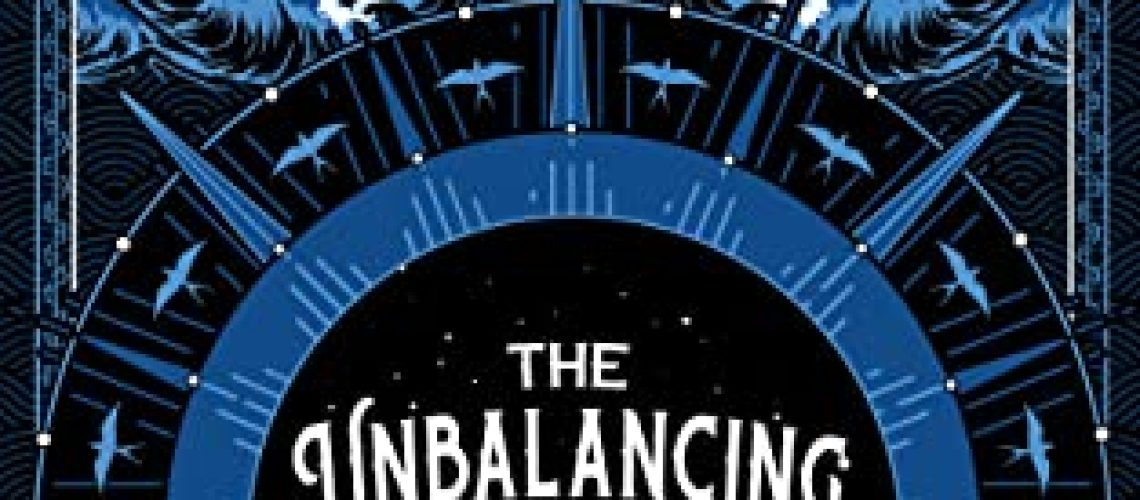I found R.B. Lemberg’s The Unbalancing to be curiously satisfying and soothing, despite my unfamiliarity with the setting and despite the rising tensions felt by the protagonists and their people. I felt drawn to the mythology of Lemberg’s Birdverse and was intrigued by the structure of the Gelle-Geu island society, but most of all, I enjoyed the well-developed characters, their contrasts, and where their interactions led — to a relationship, to magical discoveries, and to a struggle for survival amid upheavals.

I’d been following Lemberg for quite a while on the a social media site, as someone who’d interacted positively with others whom I follow, but I’d never read any of their poems or stories. This book’s front cover said “A Birdverse Novel,” so I was immediately hesitant, as I prefer not to jump into later books of series if possible (although I often run across something interesting enough to spur me to find the first book). But The Unbalancing has a beautiful cover (despite the three different fonts), it wasn’t too long (241 pages plus end matter), and the back cover description was really interesting, so I picked it up.
“Beneath the waters by the islands of Gelle-Geu, a star sleeps restlessly. The celebrated new starkeeper Ranra Kekeri, who is preoccupied by the increasing tremors, confronts the problems left behind by her predecessor. Meanwhile, the poet Erígra Lilún, who merely wants to be left alone, is repeatedly asked by their ancestor Semberí to take over the starkeeping helm. …“
The poet Erígra Lilún feels a deep connection to the natural world, but needs frequent rests from society. Erígra refuses their ancestral ghost’s urgings to become the new starkeeper, a position of magical and political power, but eventually meets Ranra, the woman who does become starkeeper, and tells her about their dreams of the increasingly restless star beneath the waves. The energetic Ranra is dismayed to find that the previous starkeeper had been ignoring mounting problems, and leaps into action to overcome her community’s inertia against addressing them; meanwhile, she also grabs a bit hastily for a relationship with the intriguing Erígra, before the couple can really understand each other.
Despite this slightly false start, Ranra and Erígra learn to communicate past their differences and even appreciate them, and start laying the foundations for a relationship that’s not only sexy, but sound. I really like that although Erígra needs quiet sometimes, she is not frail: She knows herself, she makes her own decisions and resists being pushed, and she speaks up for herself, given time. Ranra is short on time and attention (understandably, given the crises besetting Gelle-Geu), but learns to listen.
They’re the protagonists, but the book also has several intriguing secondary characters, including shipbuilding Dorod, Ranra’s sometime lover Veruma, and the academic Ulár. Deft
worldbuilding and character developments make this magical world feel complex and real.
I do really like the magic system, although it’s more sketched than explored. I’ve liked the idea of magic based on names ever since reading LeGuin’s Earthsea books as a teenager; here, people choose their deepnames, taking up to three if they’re powerful enough, and use resonances to connect to and control their environment. However, that control only goes so far, especially when unseen forces have been neglected long enough to build up vast momentum.
As it turns out, the difficulty is not so much the people of Gelle-Geu as the problematic origins of power before the islanders ever arrived. Sometimes fate can be irresistible, and people have to learn when to fight it, when to escape it if possible, and when and how to endure whatever comes, and preserve just enough of their homes and homelands to try to start afresh.
Finally, I really enjoy the pacing and the writing style in this book: deliberate, plain and direct sometimes, although often referring to complex situations; however, the language rises to lyrical near-rhapsodies in some descriptions. I will definitely be looking up Lemberg’s poetry after this, having now read the poem out of which this book arose: “Ranra’s Unbalancing,” Strange Horizons, 23 November 2015. Lemberg has set other poems and stories in the Birdverse, and I look forward to reading more.
Readers can find an interview with Lemberg here: https://fantasy-hive.co.uk/2022/06/interview-with-r-b-lemberg-the-unbalancing/
Readers can buy The Unbalancing and can also read about its nomination as a Subjective Chaos Kind of Award finalist here: https://tachyonpublications.com/r-b-lembergs-the-unbalancing-is-a-subjective-chaos-kind-of-award-scka-finalist/
Content warnings: Natural disasters and deaths, abusive relative, sex (erotic but not graphic)
Comparisons: Ursula K. LeGuin’s A Wizard of Earthsea, etc.; Patricia McKillip’s The Changeling Sea; Aliette de Bodard’s Fireheart Tiger
Disclaimers: None needed. I found this in the new books section of my lovely local library.







